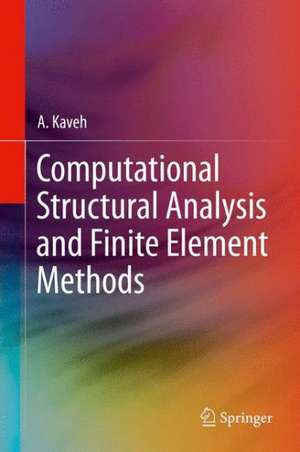Computational Structural Analysis and Finite Element Methods
Autor A. Kavehen Limba Engleză Hardback – 6 ian 2014
| Toate formatele și edițiile | Preț | Express |
|---|---|---|
| Paperback (1) | 951.77 lei 6-8 săpt. | |
| Springer International Publishing – 22 aug 2016 | 951.77 lei 6-8 săpt. | |
| Hardback (1) | 952.54 lei 6-8 săpt. | |
| Springer International Publishing – 6 ian 2014 | 952.54 lei 6-8 săpt. |
Preț: 952.54 lei
Preț vechi: 1161.64 lei
-18% Nou
Puncte Express: 1429
Preț estimativ în valută:
182.31€ • 196.79$ • 152.87£
182.31€ • 196.79$ • 152.87£
Carte tipărită la comandă
Livrare economică 19 aprilie-03 mai
Preluare comenzi: 021 569.72.76
Specificații
ISBN-13: 9783319029634
ISBN-10: 3319029630
Pagini: 448
Ilustrații: XVI, 432 p. 305 illus., 90 illus. in color.
Dimensiuni: 155 x 235 x 30 mm
Greutate: 0.8 kg
Ediția:2014
Editura: Springer International Publishing
Colecția Springer
Locul publicării:Cham, Switzerland
ISBN-10: 3319029630
Pagini: 448
Ilustrații: XVI, 432 p. 305 illus., 90 illus. in color.
Dimensiuni: 155 x 235 x 30 mm
Greutate: 0.8 kg
Ediția:2014
Editura: Springer International Publishing
Colecția Springer
Locul publicării:Cham, Switzerland
Public țintă
ResearchCuprins
Basic concepts of structural analysis and graph theory.- Optimal force method of structural analysis.- Optimal displacement method of structural analysis.- Ordering for optimal patterns of structural matrices: graph theory methods.- Ordering for optimal patterns of structural matrices: algebraic graph theory and meta-heuristic methods.- Optimal force method for FEMs: low order elements.- Optimal force method for FEMs: high order elements.- Decomposition for parallel computing: graph theory methods.- Analysis of regular structures using graph products.- Simultaneous analysis, design and optimization of structures using force method and supervised CSS.
Textul de pe ultima copertă
Graph theory gained initial prominence in science and engineering through its strong links with matrix algebra and computer science. Moreover, the structure of the mathematics is well suited to that of engineering problems in analysis and design. The methods of analysis in this book employ matrix algebra, graph theory and meta-heuristic algorithms, which are ideally suited for modern computational mechanics. Efficient methods are presented that lead to highly sparse and banded structural matrices. The main features of the book include: application of graph theory for efficient analysis; extension of the force method to finite element analysis; application of meta-heuristic algorithms to ordering and decomposition (sparse matrix technology); efficient use of symmetry and regularity in the force method; and simultaneous analysis and design of structures.
Caracteristici
Efficient methods leading to highly sparse and banded structural matrices
Application of graph theory for efficient analysis of skeletal structures
Many worked examples and exercises will help the reader to appreciate the theory
Includes supplementary material: sn.pub/extras
Application of graph theory for efficient analysis of skeletal structures
Many worked examples and exercises will help the reader to appreciate the theory
Includes supplementary material: sn.pub/extras







